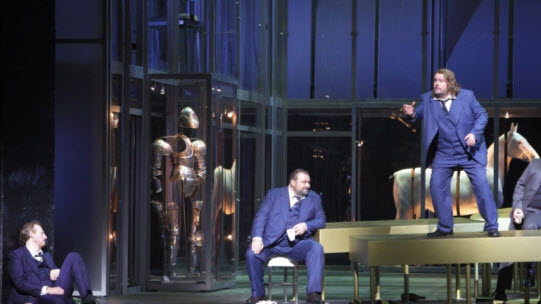 Germany Wagner: Götterdämmerung, Bayerische Staatsoper Orchestra and Chorus, Kirill Petrenko (conductor), Nationaltheater, Munich, 29.3.2015 (JMI)
Germany Wagner: Götterdämmerung, Bayerische Staatsoper Orchestra and Chorus, Kirill Petrenko (conductor), Nationaltheater, Munich, 29.3.2015 (JMI)

Cast:
Brünnhilde: Rebecca Teem
Siegfried: Stephen Gould
Hagen: Hans-Peter König
Gutrune: Anna Gabler
Gunther: Alejandro Marco-Buhrmester
Alberich: Tomasz Konieczny
Waltraute: Okka Von Der Demerau
Woglinde: Hanna-Elisabeth Müller
Wellgunde: Jennifer Johnston
Flosshilde: Nadine Weissmann
First Norn: Okka Von Der Demerau
Second Norn: Nadine Weissmann
Third Norn: Anna Gabler
Production: Bayerische Staatsoper
Direction: Andreas Kriegenburg
Sets: Harald B. Thor
Costumes: Andrea Schraad
Lighting: Stefan Bolliger
With Götterdämmerung, Munich’s Ring of the Nibelung has come to a triumphant end from a musical point of view, although opinions on the staging were mixed. The singers’ performances were generally admirable, although there was an important, last-minute substitution that affected the final artistic result.
In my review of Siegfried I wrote that Andreas Kriegenburg’s production had made a lesser impression on me than when I first saw it in 2012. I thought that this difference might be based on the absence of the “surprise factor,” and something similar happened here. Kriegenburg’s work is a fierce critique of capitalist society which he considers responsible for the economic crisis we’ve suffered, and the cause of important accidents, such as Fukushima in Japan. The truth is that both the crisis and the nuclear accident were more pertinent in 2012 than they are three years later. I don’t mean that his vision is without relevance, but it is somewhat dated, and it may seem more so in the future.
Kriegenburg’s idea becomes very clear at the end of the opera, where his use of extras is not capricious but something that responds to his dramatic concept. Greed, lust for power, the struggle for gold have brought destruction – call it crisis – and in the final scene we see the whole cast of extras, dressed in white, embracing the survivor of the disaster, Gutrune.
For the most part the set consists of a large room with several floors, the headquarters of a major bank and of the Gibichungs. It is a modern, impersonal and dehumanized scenario, where employees, curiously, wear Chinese-style uniforms. In the last act the building has entered into a genuine decline. The biggest problem with this staging is that it breaks completely with the attachment to nature in the three previous operas.
Kriegenburg presents Hagen and Gunther as depraved beings searching for power and money, and Gutrune as an elegant young lady. Throughout the second act, the gold Euro symbol as a rocking horse is extremely significant. The chorus continually uses mobile phones to send and receive messages and to take pictures, which becomes somewhat tiresome. As with Siegfried, I was left with a positive impression, but rather less so than when the production premiered.
The real triumph of this Ring belongs to Kirill Petrenko. Clearly in Munich they are very happy with him. The audience’s reaction was very different than what it used to be with Kent Nagano. Petrenko’s conducting was vivid and bright, but I wasn’t completely convinced in Act I where I felt emotion was missing in the scene of Waltraute and Brünnhilde. However, the next two acts were superb and so was the audience’s reaction: Mr. Petrenko and his orchestra received a unanimous standing ovation, a storm of cheers. The Orchestra was once again impressive.
Petra Lang had been announced to play Brünnhilde, and her name was listed in the program, but something unexpected happened. She was replaced by Rebecca Teem, although many in the audience did not realize there had been a change. Apparently, Rebecca Teem was the cover for the part, and while her voice is well-suited in the middle and shines on the high notes, they are not always perfectly controlled. Her weakest part lies in the low notes, which are practically inaudible. In short, she was a satisfactory last-minute replacement.
Once more, Stephen Gould offered strength, quality and pitch in the character of Siegfried. He sang the role of the mature Siegfried three years ago, but he is much improved in the role, which is better for him and, of course, for the spectators. He is without a doubt the best Siegfried today, overshadowing his colleagues.
Hans-Peter König as Hagen was excellent too, powerful and with a voice that could not be better-suited to this evil character. As in the case of Stephen Gould, König is, in my opinion, the best Hagen around.
Anna Gabler repeated her Gutrune, and she was very convincing. In vocal terms I found her better than three years ago. She also sang the Third Norn in the opening scene. Baritone Alexander Marco-Buhrmester was an acceptable Gunther, perhaps lighter than what the character requires. Tomasz Konieczny was again a fine Alberich in the scene with his son Hagen. Okka Von Der Demerau was good as Waltraute, although I was not particularly moved by her. She doubled as First Norn.
For those who are interested, Mr. Petrenko’s musical reading lasted four hours and seven minutes, thirty-two minutes faster than Mr. Nagano’s.
José M. Irurzun